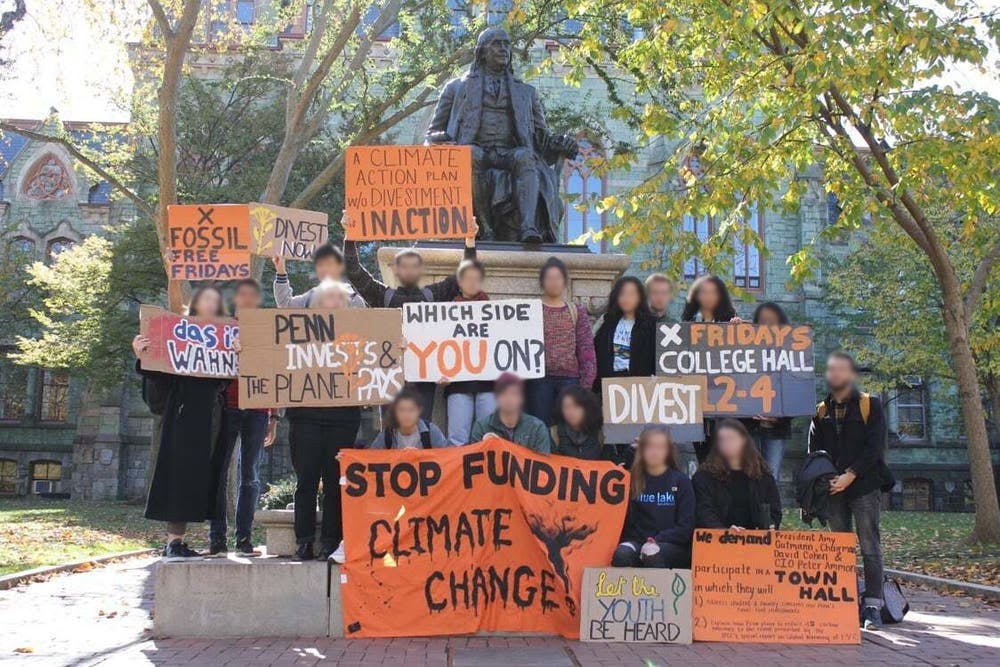Fossil Free Penn (FFP) knows the time is right.
The effects of climate change are being felt around the world, and there is no better moment than now for humanity to get its act together. This means defunding and divesting from fossil fuels—something Penn has yet to do.
In recent months, many universities, including Boston University and Ivy League institutions like Harvard, have pledged to divest their endowments from the fossil fuel industry.
As fossil fuels are the primary driver of climate change, divestment from them has become a central focus for college students frustrated by slow moving university administrations. FFP believes the current movement sweeping across college campuses may finally force Penn administration’s hand in divesting their nearly $20.5 billion endowment from fossil fuel assets.
“It makes it more feasible for Penn to divest, and for it to not to be as big of a political statement as they were worrying it would be," says FFP coordinator Katie Collier (C ‘22). "I think divestment is definitely in the future—I just hope it's soon because the world is literally ending."
At weekly GBMs, there are both seasoned FFP veterans and newer faces. Coordinator Sarah Sterinbach (C ‘24) hasn’t been to a major protest or sit–in yet, but joined after attending a preceptorial, an informal seminar designed to introduce new students to life at Penn.
“I was told it was a very action driven group, a no–bullshit kind of group,” she says.
Penn students who were on campus before the pandemic can attest to FFP’s reputation as a seemingly endless source of irritation for the administration. Every Friday in 2019, members would line the halls outside of President Amy Gutmann’s office with signs and pickets calling for the university to divest its estimated $315 million in fossil fuel assets.
In November of 2019, 100 members stormed a Board of Trustees’ meeting and forced it to shut down while chanting demands for a divestment town hall meeting with the Penn administration. High ranking trustees like David Cohen and even Gutmann were seen escaping through back entrances. In the wake of the protest, Wendell Pritchett, provost at the time, sent a threatening letter to those involved about receiving a notation on their transcript.
With the onset of the pandemic, FFP was forced to roll back many of its actions. But the new in–person semester means the group is back and looking to rebrand itself as more than just divestment activists.
“One thing we've been trying to do is become more intersectional and justice–oriented, specifically within the Philly community,” says Sarah. This includes working with a group called Earth Quaker Action Team to organize a divestment protest outside of Vanguard’s headquarters on October 29th. Vanguard, a portfolio manager, is one of the largest fossil fuel investors in the world. Notably, Gutmann serves on Vanguard’s executive board.
“Another vision that FFP has is to form a leftist coalition because justice is for everyone," says Sarah. "I want Penn to acknowledge the demands of Police Free Penn, Penn for Pilots, et cetera.” At many FFP meetings, members have discussed how to address broader issues outside of divestment in the Penn community.
Some of these issues stem from the administration’s “disrespect for the Penn and Philadelphia communities,” according to Katie. “Penn is doing research and wants to be a part of the future. Yet, they still invest in the fossil fuel industry, prison–industrial complex, and don’t recognize Indigenous People’s Day,” she says.
Despite their tumultuous battle with the administration, FFP members are confident that Penn will divest soon—they just hope it will be done in the right way. In 2020, Gutmann announced that Penn would divest from the coal and tar sand industry. But there was no mention of the efforts of student activists, who had pushed for the change for years.
“We obviously hope that Penn divests, but we hope that they divest loudly,” says Sarah. By not acknowledging student activism, FFP believes Penn is still trying to avoid giving students a seat at the decision–making table.
The group hopes that divestment will serve as a message to the Penn community and the rest of the world. “Yes, removing the money from these industries is important," says Katie. "But it's really about the political statement of divesting and saying, ‘Hey, we are this large, globally influential organization, and we do not support the fossil fuel industry and what it's doing to communities and the environment.'"
As of now, Penn has not announced plans to divest from fossil fuels anytime soon. FFP has made it clear that it plans to keep organizing, rallying, and building a coalition. Until divestment occurs, Sarah has a message for the Penn administration on behalf of FFP:
“You have the power to create change, but you're doing nothing about it. And we're not going to stop fighting until we get what we want. We're a threat. They should listen to us.”

